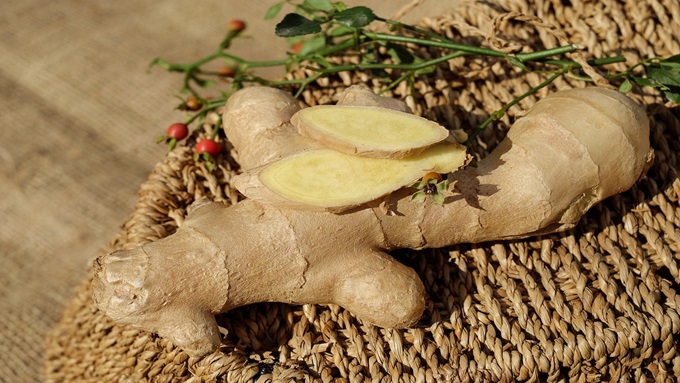In vitro Antimicrobial Activity Test of Zingiber officinale var. rubrum Rhizome Extract against Methicillin-Sensitive Staphylococcus aureus (MSSA) and Methicillin-Resistant Staphylococcus aureus (MRSA)

Downloads
Highlights:
- Staphylococcus aureus, particularly MRSA, had developed rapid resistance against antibiotics like beta-lactams.
- Red ginger is believed to be antibacterial against MSSA and MRSA in vitro.
- Red ginger rhizome extracts displayed weak activity against MSSA and MRSA.
Abstract
Introduction: Red ginger (Zingiber officinale var. rubrum) is a traditional herb that is believed to possess antibacterial properties. Throughout the years, Staphylococcus aureus has developed resistance to a broad range of antibiotics, including beta-lactams, particularly in the form of Methicillin-Resistant Staphylococcus aureus (MRSA). As treatment options dwindle, it is urgent to formulate novel antibiotics. This study aimed to examine the antibacterial activity of the ginger rhizome ethanol extract against Methicillin-Sensitive Staphylococcus aureus (MSSA) and MRSA.
Methods: This study was performed according to the post-test-only control group design. Through a good diffusion assay, the anti-MSSA and anti-MRSA activity of the red ginger extract concentrations (100%, 50%, 25%, 12.5%, and 6.25%) was observed by measuring the diameter of the clear inhibition zones. Dimethyl sulfoxide (DMSO) and an antibiotic disc were added as control groups.
Results: The red ginger extracts produced inhibition zones on both MSSA and MRSA. However, the antibacterial activity was considered weak (<12 mm). The concentration of the extract appeared to linearly affect its antibacterial activity against MSSA and MRSA. On MSSA, the 12.5% extract results differed significantly from those of the 100% and 50% extracts. Meanwhile, on MRSA, the extracts seemed to yield significantly different outcomes when compared to each other, except for the comparisons between 50%-25% and 12.5%-6.25%.
Conclusion:Zingiber officinale var. rubrum rhizome extracts showed weak antibacterial activity against MSSA and MRSA.
Riedel S, Morse SA, Mietzner TA, et al. Jawetz Melnick & Adelbergs Medical Microbiology. 28th ed. McGraw Hill LLC, https://books.google.co.id/books?id=1dSWDwAAQBAJ (2019).
Ikuta KS, Swetschinski LR, Robles Aguilar G, et al. Global Mortality Associated with 33 Bacterial Pathogens in 2019: A Systematic Analysis for the Global Burden of Disease Study 2019. Lancet 2022; 400: 2221–2248. [Journal]
Santosaningsih D, Santoso S, Setijowati N, et al. Prevalence and Characterisation of Staphylococcus aureus Causing Community-Acquired Skin and Soft Tissue Infections on Java and Bali, Indonesia. Trop Med Int Health 2018; 23: 34–44. [PubMed]
Lee AS, de Lencastre H, Garau J, et al. Methicillin-Resistant Staphylococcus aureus. Nat Rev Dis Prim 2018; 4: 18033. [PubMed]
Fergestad ME, Stamsås GA, Morales Angeles D, et al. Penicillin-Binding Protein PBP2a Provides Variable Levels of Protection toward Different β-Lactams in Staphylococcus aureus RN4220. Microbiologyopen 2020; 9: e1057. [PubMed]
Cong Y, Yang S, Rao X. Vancomycin Resistant Staphylococcus aureus Infections: A Review of Case Updating and Clinical Features. J Adv Res 2020; 21: 169–176. [PubMed]
Almuhayawi MS, Alruhaili MH, Gattan HS, et al. Staphylococcus aureus Induced Wound Infections which Antimicrobial Resistance, Methicillin- and Vancomycin-Resistant: Assessment of Emergence and Cross Sectional Study. Infect Drug Resist 2023; 16: 5335–5346. [PubMed]
Takó M, Kerekes EB, Zambrano C, et al. Plant Phenolics and Phenolic-Enriched Extracts as Antimicrobial Agents against Food-Contaminating Microorganisms. Antioxidants (Basel, Switzerland) 2020; 9. [PubMed]
Assegaf S, Kawilarang AP, Handajani R. Antibacterial Activity Test of Red Ginger Extract (Zingiber officinale var. Rubrum) against Streptococcus pyogenes In Vitro. Biomol Heal Sci J 2020; 3: 24–27. [Journal]
Yang JJ, Rahmawati F. Antimicrobial Effects of Various Red Ginger (Zingiber officinale) Extract Concentrations on Escherichia coli Bacteria. Eur J Biotechnol Biosci 2022; 10: 63–67. [Journal]
Widiastuti D, Pramestuti N. Uji Antimikroba Ekstrak Jahe Merah (Zingiber officinale) terhadap Staphylococcus aureus. Sel J Penelit Kesehat 2018; 5. [Journal]
Nurhayati L, Yahdiyani N, Hidayatulloh A. Perbandingan Pengujian Aktivitas Antibakteri Starter Yogurt dengan Metode Difusi Sumuran dan Metode Difusi Cakram. J Teknol Has Peternak 2020; 1: 41. [ResearchGate]
Sharma N, Rana D, Ghai S. Research Designs. 2019.
Jung MY, Lee MK, Park HJ, et al. Heat-Induced Conversion of Gingerols to Shogaols in Ginger as Affected by Heat Type (Dry or Moist Heat), Sample Type (Fresh or Dried), Temperature and Time. Food Sci Biotechnol 2018; 27: 687–693. [PubMed]
Clinical and Laboratory Standards Institute. Performance Standards for Antimicrobial Susceptibility Testing. Philadelphia, https://www.nih.org.pk/wp-content/uploads/2021/02/CLSI-2020.pdf (2020).
Serdar CC, Cihan M, Yücel D, et al. Sample Size, Power and Effect Size Revisited: Simplified and Practical Approaches in Pre-Clinical, Clinical and Laboratory Studies. Biochem Medica 2021; 31: 10502. [PubMed]
Nie NH, Bent DH, Hull CH. Statistical Package for the Social Sciences (SPSS), https://www.ibm.com/support/pages/downloading-ibm-spss-statistics-29 (2022).
Srikandi S, Humaeroh M, Sutamihardja RTM. Kandungan Gingerol dan Shogaol dari Ekstrak Jahe Merah (Zingiber Officinale Roscoe) dengan Metode Maserasi Bertingkat. al-Kimiya 2020; 7: 75–81. [ResearchGate]
Amalia RT, Tukiran T, Sabila F, et al. Phytochemical Screening and Total Phenolic Compounds of Red Ginger (Zingiber officinale) and Secang Wood (Caesalpinia sappan) as Preliminary Test of Antiarthritis. Chim Nat Acta 2021; 9: 14–19. [Journal]
Zulkarnain Z, Muthiadin C, Nur F, et al. Potensi Kandungan Senyawa Ekstraksi Daun Patikan Kebo (Euphorbia hirta L.) sebagai Kandidat Antibiotik Alami. Teknosains Media Inf Sains dan Teknol 2021; 15: 190. [Journal]
Mahizan NA, Yang S-K, Moo CL, et al. Terpene Derivatives as a Potential Agent against Antimicrobial Resistance (AMR) Pathogens. Molecules 2019; [PubMed]
Lopes TS, Fussieger C, Theodoro H, et al. Antimicrobial Activity of Essential Oils against Staphylococcus aureus and Staphylococcus chromogenes Isolated from Bovine mastitis. Braz J Microbiol 2023; 54: 2427–2435. [PubMed]
Widowati R, Handayani S, Al Fikri AR. Phytochemical Screening and Antibacterial Activities of Senggani (Melastoma malabathricum L.) Ethanolic Extract Leaves. J Ilmu Pertan Indones 2021; 26: 562–568. [Journal]
Syafitri D, Levita J, Mutakin M, et al. A Review: Is Ginger (Zingiber officinale var. Roscoe) Potential for Future Phytomedicine? Indones J Appl Sci 2018; 8. [ResearchGate]
Bhaskar A, Kumari A, Singh M, et al. [6]-Gingerol Exhibits Potent Anti-Mycobacterial and Immunomodulatory Activity against Tuberculosis. Int Immunopharmacol 2020; 87: 106809. [PubMed]
Rampogu S, Baek A, Gajula RG, et al. Ginger (Zingiber officinale) Phytochemicals-Gingerenone-A and Shogaol Inhibit SaHPPK: Molecular Docking, Molecular Dynamics Simulations and In Vitro Approaches. Ann Clin Microbiol Antimicrob 2018; 17: 16. [PubMed]
Tagousop CN, Tamokou JD, Ekom SE, et al. Antimicrobial Activities of Flavonoid Glycosides from Graptophyllum grandulosum and Their Mechanism of Antibacterial Action. BMC Complement Altern Med 2018; 18: 252. [PubMed]
Sinsinwar S, Vadivel V. Catechin Isolated from Cashew Nut Shell Exhibits Antibacterial Activity against Clinical Isolates of MRSA through ROS-Mediated Oxidative Stress. Appl Microbiol Biotechnol 2020; 104: 8279–8297. [PubMed]
Abbasi M, Gholizadeh R, Kasaee SR, et al. An Intriguing Approach toward Antibacterial Activity of Green Synthesized Rutin-Templated Mesoporous Silica Nanoparticles Decorated with Nanosilver. Sci Rep 2023; 13: 5987. [PubMed]
Rumanti R, Suprianto S, Tarigan J, et al. Potensi Antibakteri Kombinan Zingiber officinale var. Rubrum dengan Cinnamomum burmannii terhadap Staphylococcus aureus. J Indah Sains dan Klin 2021; 2: 6–10. [ResearchGate]
Putri AYS, Purwanta M, Indiastuti D, et al. Antibacterial Activity Test of Jatropha multifida L. sap against Staphylococcus aureus and Methicillin Resistant Staphylococcus aureus (MRSA) In Vitro. Indian J Forensic Med Toxicol 2021; 15: 2015–2020. [Journal]
Odilia R, Putri D, Rosetyadewi A, et al. Identification of Antinutritional, Antioxidant, and Antimicrobial Activity of Plants that Cause Livestock Poisoning in Bojonegoro Regency, Indonesia. Vet World 2022; 15: 2131–2140. [ResearchGate]
Alhadrami HA, Hamed AA, Hassan HM, et al. Flavonoids as Potential Anti-MRSA Agents through Modulation of PBP2a: A Computational and Experimental Study. Antibiot (Basel, Switzerland) 2020; 9. [PubMed]
Guo Q, Ren C, Cai J, et al. The Synergistic Inhibition and Mechanism of Epicatechin Gallate and Chitosan against Methicillin-Resistant Staphylococcus aureus and the Application in Pork Preservation. LWT 2022; 163: 113575. [ScienceDirect]
Gio P, Suyanto. Statistika Nonparametrik dengan SPSS, Minitab dan R. 2018.
Setiawan R, Hariyono D. Pengaruh Beberapa Unsur Iklim (Curah Hujan, Suhu Udara, dan Kelembaban Udara) Terhadap Produktivitas Tanaman Jahe (Zingiber officinale). J Produksi Tanam 2022; 10: 659–667. [Journal]
Copyright (c) 2024 Alden Jieputra, Marijam Purwanta, Arifa Mustika, Wiwin Retnowati

This work is licensed under a Creative Commons Attribution-ShareAlike 4.0 International License.
1. The journal allows the author to hold the copyright of the article without restrictions.
2. The journal allows the author(s) to retain publishing rights without restrictions
3. The formal legal aspect of journal publication accessibility refers to Creative Commons Atribution-Share Alike 4.0 (CC BY-SA).




























